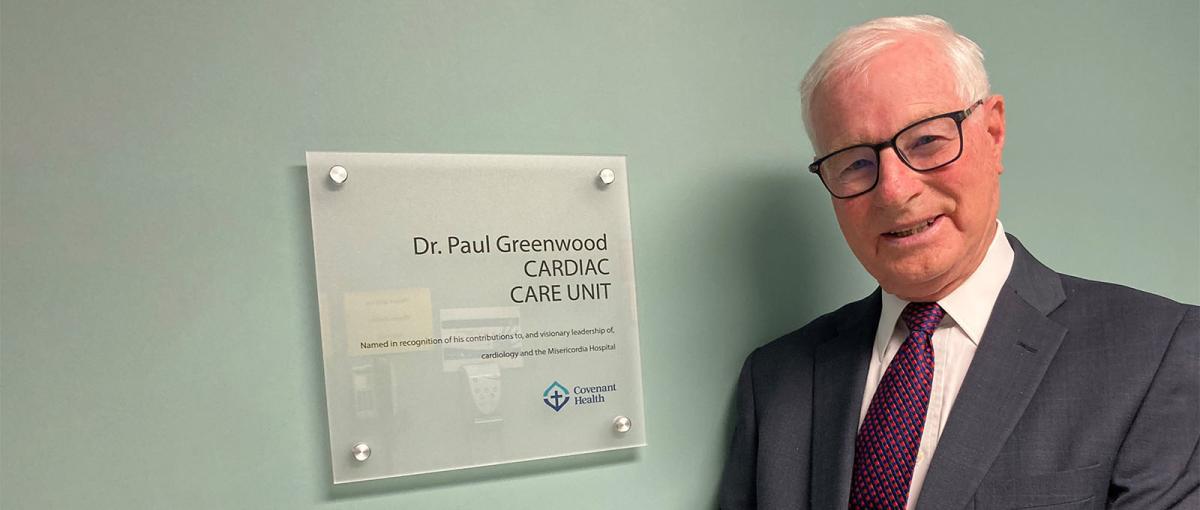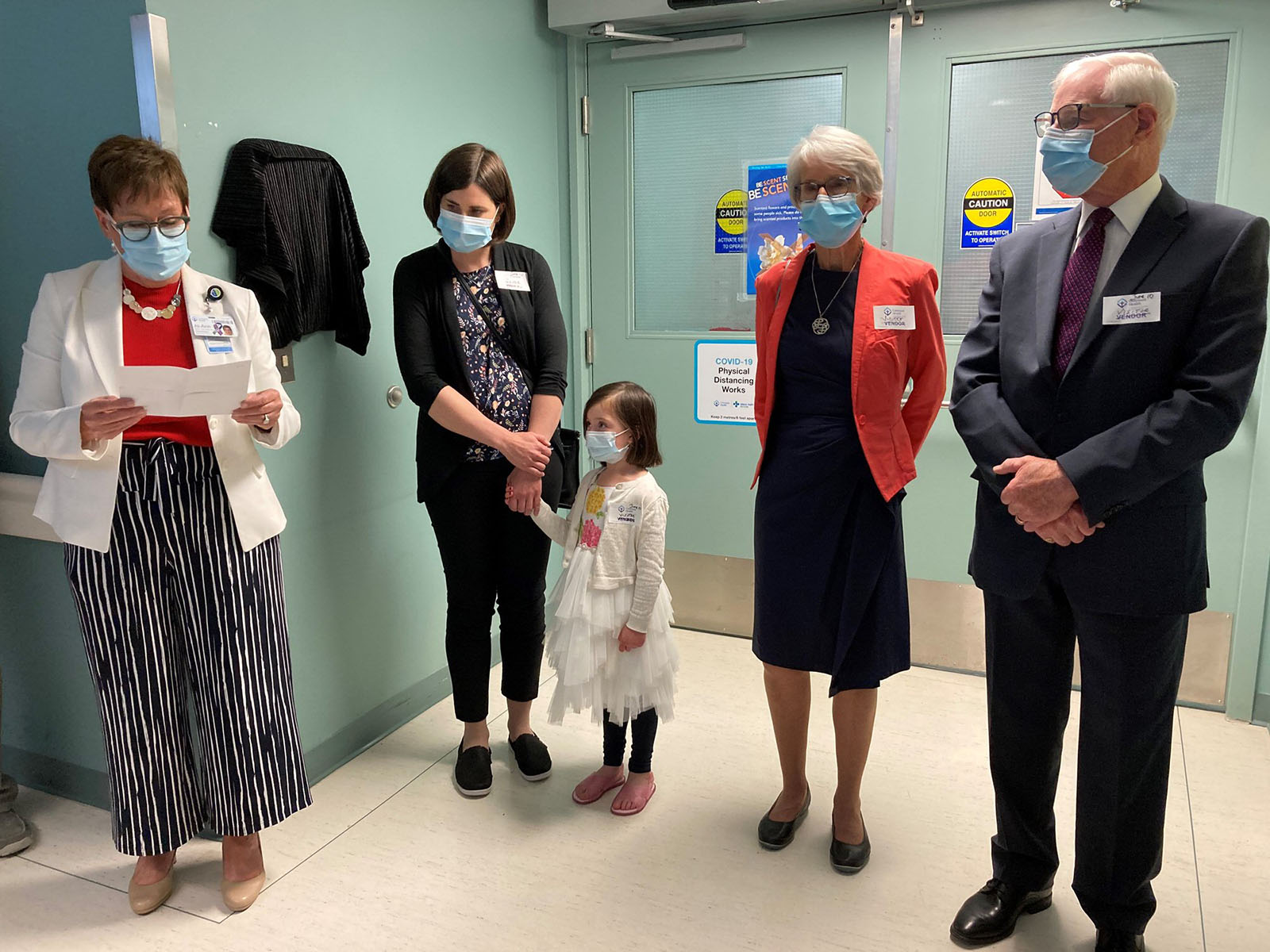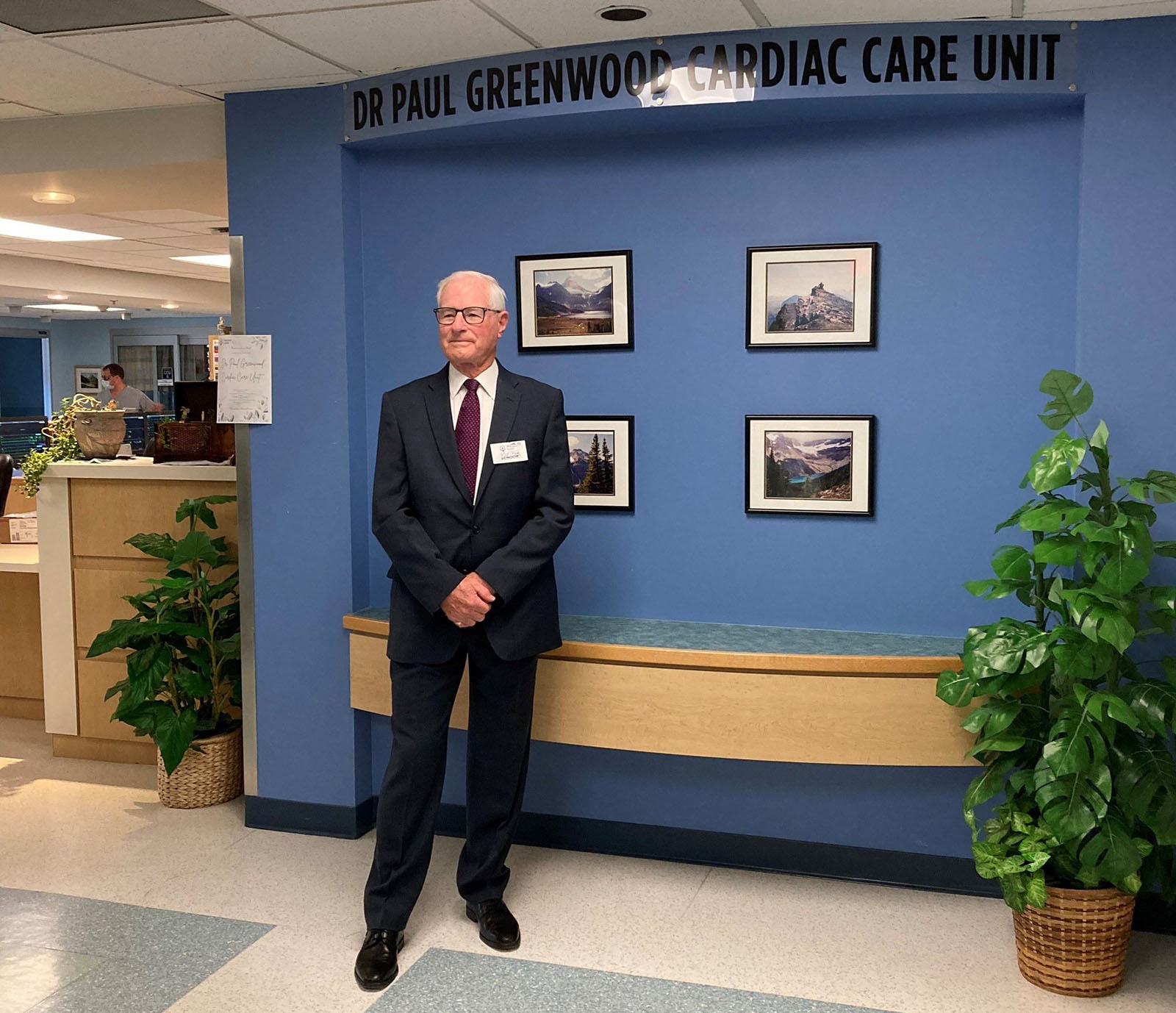Honouring a legacy of cardiac care
Misericordia Community Hospital renames cardiac care unit in honour of Dr. Paul Greenwood

August 30, 2022
By Marguerite Watson, senior advisor, content lead
When Dr. Paul Greenwood retired from his medical practice in 2019, his friend and colleague Dr. Tim Muzyka, cardiologist, wanted to do something to recognize his significant contributions to the cardiac care unit where they worked together at Covenant Health's Misericordia Community Hospital. He decided to advocate for having the unit renamed in Paul’s honour.
“There are precedents set across the region at other facilities of recognizing individuals for their contributions to clinical care, teaching and research, and especially within cardiology, there are several different units named after previous attending physicians, so I thought this would be an appropriate step to take within the Misericordia hospital,” says Tim.
Though Tim began the process with a proposal to Covenant Health administration three years ago, the project really got off the ground last summer, when the organization approved its Honourific and Philanthropic Naming and Recognition policy. The policy gives Covenant Health the “ability to name physical and/or academic entities to recognize the extraordinary generosity of philanthropic and honourific person(s) whose support and service are valuable to the Covenant Health community.”
Following formal procedures, Tim gathered letters of support from the Misericordia hospital administration and colleagues as well as documentation of Paul’s service. Once Covenant Health leadership approved the honourific naming, he worked with Jo Ann Molloy, senior operating officer for acute services at the Misericordia, to plan the details.
Paul’s service has been extraordinary, says Jo Ann. “He was instrumental in establishing the critical care program and an intensive care unit at the site, from which the current cardiac care unit was formed. Given his involvement, we felt renaming the unit was the perfect vehicle for formally recognizing his legacy.”
Paul, who completed his medical and specialty training in England, joined the Misericordia staff as the full-time director of a combined cardiac care-intensive care unit in September 1979. Several years later, the unit was divided into a cardiology side and an intensive care side in the same facility. Then in 2000, the cardiac care unit became a separate unit in its current space.
“When he came to the Misericordia, there weren’t a lot of people in Canada who had formal training in a lot of specialty areas,” says Tim. “Those programs were in their infancy, so it was a great thing to get somebody with his training here.”
“His bringing those skills brought sort of a new philosophy to the hospital that you could provide the best clinical care for the patient by instilling a culture of excellence in clinical care, excellence in research and excellence in teaching. By doing those three things, we've developed and grown our cardiac sciences program at the Misericordia hospital to what it is now.”
As the attending physician for the unit, Paul served countless patients and families as well as the wider community. When Pope John Paul II visited Edmonton in 1984, Paul was asked to be on call should His Holiness need immediate medical care. The next year, he was the attending physician on call when Most Rev. and Rt. Hon. Robert Runcie, Archbishop of Canterbury, visited the city. “The then (Anglican) bishop asked me to be available if the archbishop needed any medical care,” says Paul. “I was pleased to be able to reply that having been on call for a pope, I was certain I could manage an archbishop!”
During his long career with Covenant Health, Paul also served as director of education for the Misericordia’s medicine department, chief of cardiology for the Misericordia and chief of cardiology for Caritas Health Group (now Covenant Health). He also maintained an extensive academic career in teaching and research at the University of Alberta. And he held administrative roles at the Misericordia, including that of medical staff president, and within the Edmonton Zone as the first head of cardiac services and worked with numerous medical committees and advisory councils provincially and nationally.
In their letters of support for the honourific naming, colleagues described Paul’s legacy to the unit as “first-class care” and a “culture of continuing education.” They recognized him for being a “strong, compassionate” practitioner who always put patient care first. His concern for patients resulted in the Misericordia being an early adopter of new treatments such as thrombolytic therapy, gaining access to angioplasty and becoming an early participant in multicentre research.
As one colleague wrote, “I found him to be personally a man of great wisdom, kindness, fairness, honesty and grace who generously contributed his talents and skills to enhancing care in Edmonton, at the Misericordia Community Hospital, in Alberta Health Services, for cardiac patients, for non-cardiac patients — basically for the greater good.”
Tim and other colleagues also spoke of Paul’s legacy as a role model and mentor. “He certainly has been for me, and he is for a lot of the people that he and I have recruited to the department over the last 30 years,” says Tim. “He’s the role model we should all be looking for, not only as medical staff but as human beings.”
The Misericordia hospital held a renaming ceremony for the unit on June 10 with Paul, his family, friends and many former colleagues in attendance. Paul’s eldest daughter, Rev. Anna Greenwood-Lee, Bishop of the Anglican Diocese of British Columbia, gave a blessing at the ceremony. The honourific naming is commemorated on a plaque outside the main doors to the unit as well as in bold letters on the wall at the entrance.
“I was obviously flattered, and I did recognize that it was an unusual honour because it was the first time that the Misericordia had named anything after anybody,” says Paul.
Going forward, Paul hopes the unit can continue to offer the kind of care that he tried to foster there — compassionate and comprehensive care that takes a holistic approach to people’s illness and recognizes the impact any illness has on an individual.
“We’ve always been known for the care that we’ve delivered, particularly the followup that we give. If you have a heart attack or a heart problem, it’s not just a three- or four-day episode; it’s a journey for the rest of your life that needs to be managed appropriately. This long-term approach to the management of heart disease is something that I hope we can continue to do.”

Jo Ann Molloy, senior operating officer for the Misericordia, presented the plaque commemorating the honourific naming of the unit.

Dr. Paul Greenwood was flattered by the renaming of the Misericordia cardiac care unit in his honour.